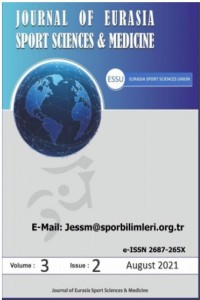Öz
Kaynakça
- Akman, Y., Imamoğlu Akman, G. (2017). Examination of Teachers ' Multicultural Education Attitude According to Social Intelligence Perception. Sakarya University Journal Of Education, 7(1), 34-48.
- Doğan, T. & Çetin B. (2008). Study of the Relationship of Social Intelligence Levels of University Students With Depression and Some Variables, International Journal of Human Sciences, 5(2), 1-19.
- Doğan, T., Totan, T., Sapmaz, F. (2009). Self-Esteem and Social Intelligence in College Students. Sakarya University Journal of Education Department, 17, 235-247.
- Doğan, T., (2006). Study of the Relationship of Social Intelligence Levels of University Students With Depression and Some Variables, Sakarya University, Institute of Social Sciences, Unpublished Master's Thesis, Sakarya.
- Goleman, D. (1999). Emotional Intelligence At Work, Istanbul: Varlik Publications.
- Günaydın, Ş. (2017). An Examination of the Effect of Positive Psychology Lecture Given for A While on Students ' Emotional Intelligence and Social Intelligence (Unpublished Master's Thesis). Üsküdar University the Institute of Social Sciences, Istanbul.
- Kadalak Dölek, A., (2015), Examination of Communication Skills of University Students in terms of Different Variables, Atatürk University, Institute of Educational Sciences, Unpublished Master's Thesis, Erzurum.
- Karasar, N. (1994). “Scientific Research Method: Concepts, Principles, Techniques”. Ankara: 3A Research Training Consultancy Ltd.
- Kaya, N., Turan, N., Kanberova, H. A., Cenal, Y., Kahraman, A., Evren, M. (2016). Communication Skills and Social Intelligence Levels According to Art Characteristics of Nursing Students. Journal of Education and Research in Nursing, 13(1), 50-58.
- Nagra, V. (2014). Social Intelligence and Adjustment of Secondary School Students, Indian Journal of Research, 3(4), 86-87.
- Naseri, S., Badriazarin, Y. & Najafzade, M. R. (2014), The Relationship Between Social Intelligence and Capabilities and Skills of PE Teachers in Tabriz, Journal of Science and Today’s World, 3(9), 435-439.
- Phipps, C. J. (2007). Social Intelligence: the Heart and Science of Human Relationships. Social Intelligence Styles, 1, 4-5.
- Saxena, P. & Jain, R. K., (2013), Social Intelligence of Undergraduate Students in Relation to Their Gender and Subject Stream, IOSR Journal of Research Method in Education, 1(1), 1-4.
- Silvera, D. H., Martinussen, M., Dahl, T. I. (2001). The Tromso Social Intelligence Scale, a self-report measure of social intelligence. Scandinavian Journal of Psychology, 42(4), 313-319.
- Ülker, Ç. (2016). Examination of Social Intelligence and Communication Skills of Vocational School Students in Terms of Different Variables. Master's Thesis, Nişantaşı University Institute of Social Sciences, Istanbul.
The Students of the School of of Physical Education and Sports' Examination of the Social Intelligence Levels According to Different Variables
Öz
The aim of this research is to investigate the social intelligence levels of individuals studying at Kyrgyzstan-Turkey Manas University, College Of Physical Education And Sports. In the research, a descriptive screening model has been used. The study group consists of 77 male and 25 female participants studying in the 2019-2020 academic year at Kyrgyzstan-Turkey Manas University, College Of Physical Education And Sports.
For the data of the research, "Personal Information Form", prepared by the researcher, was used, and to determine the social intelligence levels of the participants, Tromso Social Intelligence Scale (TSIS), developed by Silvera et al. (2001) was used. This scale is prepared to reveal the level of social intelligence and consists of 21 articles.
As a result, it has been confirmed that there has been no significant difference in gender, age, department and location.
Anahtar Kelimeler
Kaynakça
- Akman, Y., Imamoğlu Akman, G. (2017). Examination of Teachers ' Multicultural Education Attitude According to Social Intelligence Perception. Sakarya University Journal Of Education, 7(1), 34-48.
- Doğan, T. & Çetin B. (2008). Study of the Relationship of Social Intelligence Levels of University Students With Depression and Some Variables, International Journal of Human Sciences, 5(2), 1-19.
- Doğan, T., Totan, T., Sapmaz, F. (2009). Self-Esteem and Social Intelligence in College Students. Sakarya University Journal of Education Department, 17, 235-247.
- Doğan, T., (2006). Study of the Relationship of Social Intelligence Levels of University Students With Depression and Some Variables, Sakarya University, Institute of Social Sciences, Unpublished Master's Thesis, Sakarya.
- Goleman, D. (1999). Emotional Intelligence At Work, Istanbul: Varlik Publications.
- Günaydın, Ş. (2017). An Examination of the Effect of Positive Psychology Lecture Given for A While on Students ' Emotional Intelligence and Social Intelligence (Unpublished Master's Thesis). Üsküdar University the Institute of Social Sciences, Istanbul.
- Kadalak Dölek, A., (2015), Examination of Communication Skills of University Students in terms of Different Variables, Atatürk University, Institute of Educational Sciences, Unpublished Master's Thesis, Erzurum.
- Karasar, N. (1994). “Scientific Research Method: Concepts, Principles, Techniques”. Ankara: 3A Research Training Consultancy Ltd.
- Kaya, N., Turan, N., Kanberova, H. A., Cenal, Y., Kahraman, A., Evren, M. (2016). Communication Skills and Social Intelligence Levels According to Art Characteristics of Nursing Students. Journal of Education and Research in Nursing, 13(1), 50-58.
- Nagra, V. (2014). Social Intelligence and Adjustment of Secondary School Students, Indian Journal of Research, 3(4), 86-87.
- Naseri, S., Badriazarin, Y. & Najafzade, M. R. (2014), The Relationship Between Social Intelligence and Capabilities and Skills of PE Teachers in Tabriz, Journal of Science and Today’s World, 3(9), 435-439.
- Phipps, C. J. (2007). Social Intelligence: the Heart and Science of Human Relationships. Social Intelligence Styles, 1, 4-5.
- Saxena, P. & Jain, R. K., (2013), Social Intelligence of Undergraduate Students in Relation to Their Gender and Subject Stream, IOSR Journal of Research Method in Education, 1(1), 1-4.
- Silvera, D. H., Martinussen, M., Dahl, T. I. (2001). The Tromso Social Intelligence Scale, a self-report measure of social intelligence. Scandinavian Journal of Psychology, 42(4), 313-319.
- Ülker, Ç. (2016). Examination of Social Intelligence and Communication Skills of Vocational School Students in Terms of Different Variables. Master's Thesis, Nişantaşı University Institute of Social Sciences, Istanbul.
Ayrıntılar
| Birincil Dil | İngilizce |
|---|---|
| Konular | Spor Hekimliği |
| Bölüm | Articles |
| Yazarlar | |
| Yayımlanma Tarihi | 30 Ağustos 2021 |
| Kabul Tarihi | 30 Ağustos 2021 |
| Yayımlandığı Sayı | Yıl 2021 Cilt: 3 Sayı: 2 |


